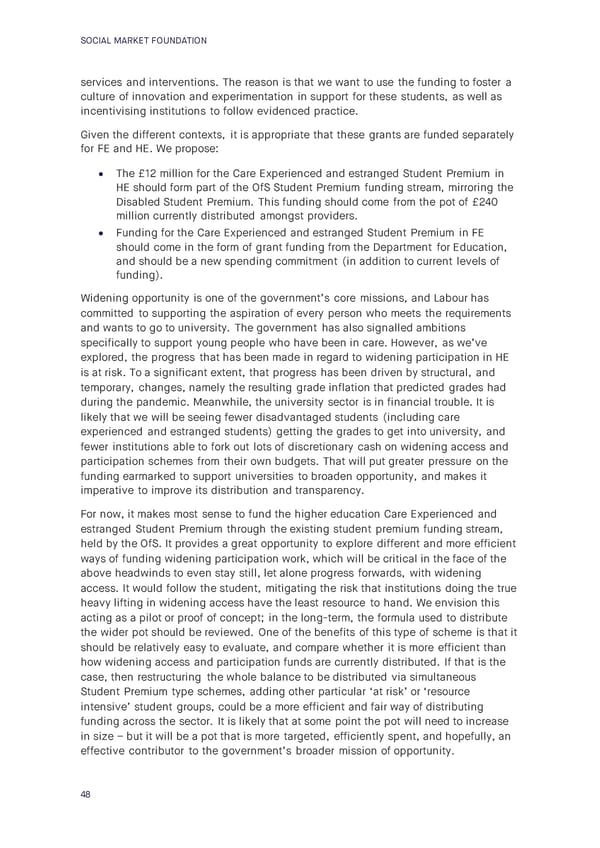SOCIAL MARKET FOUNDATION services and interventions. The reason is that we want to use the funding to foster a culture of innovation and experimentation in support for these students, as well as incentivising institutions to follow evidenced practice. Given the different contexts, it is appropriate that these grants are funded separately for FE and HE. We propose: • The £12 million for the Care Experienced and estranged Student Premium in HE should form part of the OfS Student Premium funding stream, mirroring the Disabled Student Premium. This funding should come from the pot of £240 million currently distributed amongst providers. • Funding for the Care Experienced and estranged Student Premium in FE should come in the form of grant funding from the Department for Education, and should be a new spending commitment (in addition to current levels of funding). Widening opportunity is one of the government’s core missions, and Labour has committed to supporting the aspiration of every person who meets the requirements and wants to go to university. The government has also signalled ambitions specifically to support young people who have been in care. However, as we’ve explored, the progress that has been made in regard to widening participation in HE is at risk. To a significant extent, that progress has been driven by structural, and temporary, changes, namely the resulting grade inflation that predicted grades had during the pandemic. Meanwhile, the university sector is in financial trouble. It is likely that we will be seeing fewer disadvantaged students (including care experienced and estranged students) getting the grades to get into university, and fewer institutions able to fork out lots of discretionary cash on widening access and participation schemes from their own budgets. That will put greater pressure on the funding earmarked to support universities to broaden opportunity, and makes it imperative to improve its distribution and transparency. For now, it makes most sense to fund the higher education Care Experienced and estranged Student Premium through the existing student premium funding stream, held by the OfS. It provides a great opportunity to explore different and more efficient ways of funding widening participation work, which will be critical in the face of the above headwinds to even stay still, let alone progress forwards, with widening access. It would follow the student, mitigating the risk that institutions doing the true heavy lifting in widening access have the least resource to hand. We envision this acting as a pilot or proof of concept; in the long-term, the formula used to distribute the wider pot should be reviewed. One of the benefits of this type of scheme is that it should be relatively easy to evaluate, and compare whether it is more efficient than how widening access and participation funds are currently distributed. If that is the case, then restructuring the whole balance to be distributed via simultaneous Student Premium type schemes, adding other particular ‘at risk’ or ‘resource intensive’ student groups, could be a more efficient and fair way of distributing funding across the sector. It is likely that at some point the pot will need to increase in size – but it will be a pot that is more targeted, efficiently spent, and hopefully, an effective contributor to the government’s broader mission of opportunity. 48
 Care and Learning in Higher Education Page 48 Page 50
Care and Learning in Higher Education Page 48 Page 50